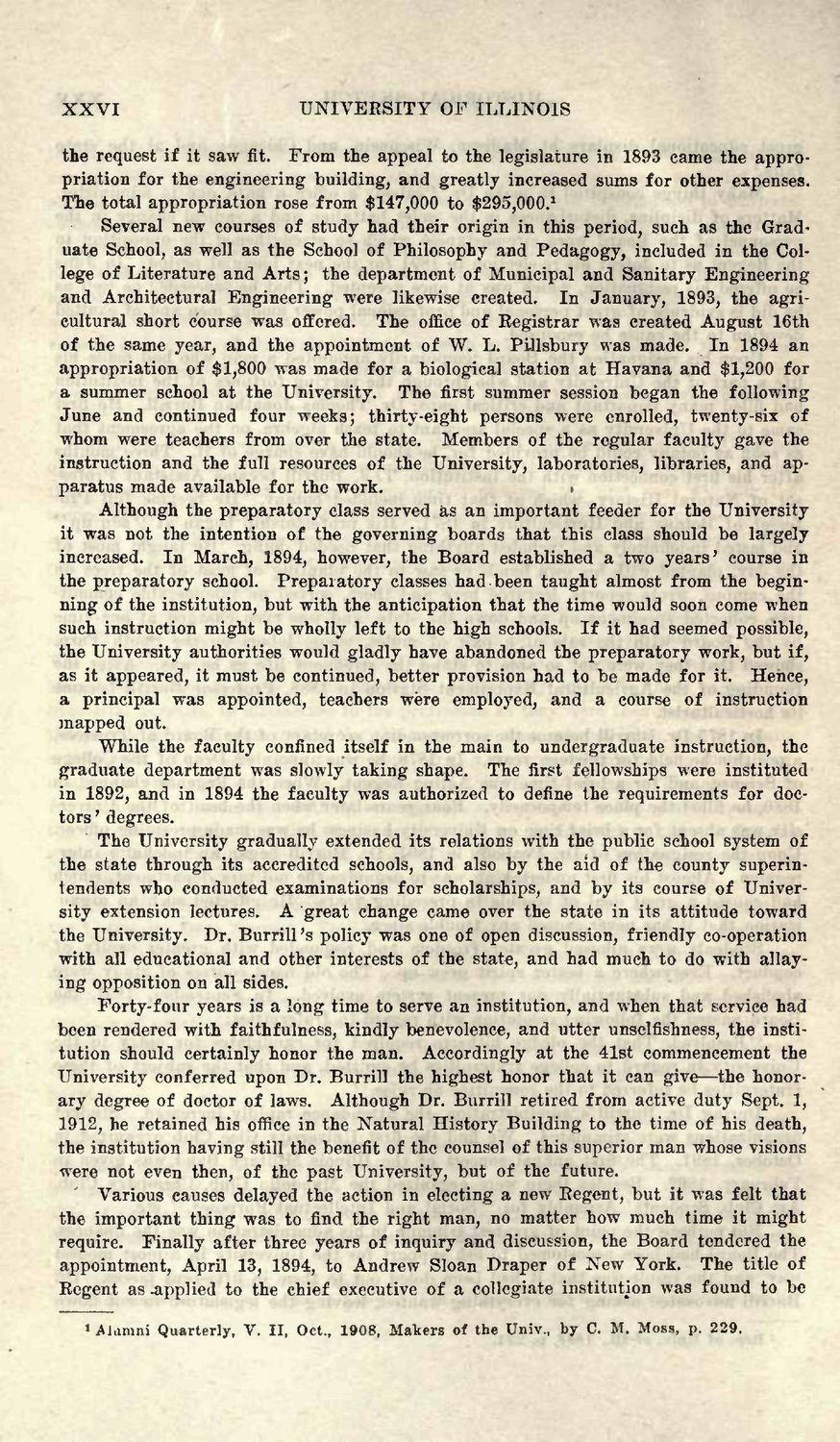| |
| |
Caption: Book - Early History of University (1916)
This is a reduced-resolution page image for fast online browsing.

EXTRACTED TEXT FROM PAGE:
XXVI UNIVEKSITY OF I L L I N O I S the request if it saw fit. From the appeal to the legislature in 1893 came the appropriation for the engineering building, and greatly increased sums for other expenses. The total appropriation rose from $147,000 to $295,000.' Several new courses of study had their origin in this period, such as the Graduate School, as well as the School of Philosophy and Pedagogy, included in the College of Literature and A r t s ; the department of Municipal and Sanitary Engineering and Architectural Engineering were likewise created. In January, 1893, the agricultural short course was offered. The office of Registrar was created August 16th of the same year, and the appointment of W. L. Pillsbury was made. In 1894 an appropriation of $1,800 was made for a biological station at Havana and $1,200 for a summer school at the University. The first summer session began the following June and continued four weeks; thirty-eight persons were enrolled, twenty-six of whom were teachers from over the state. Members of the regular faculty gave the instruction and the full resources of the University, laboratories, libraries, and apparatus made available for the work. . Although the preparatory class served as an important feeder for the University it was not the intention of the governing boards that this class should be largely increased. In March, 1894, however, the Board established a two y e a r s ' course in the preparatory school. Preparatory classes had been taught almost from the beginning of the institution, but with the anticipation t h a t the time would soon come when such instruction might be wholly left to the high schools. I f it had seemed possible, the University authorities would gladly have abandoned the preparatory work, but if, as it appeared, it must be continued, better provision had to be made for it. Hence, a principal was appointed, teachers were employed, and a course of instruction mapped out. While the faculty confined itself in the main to undergraduate instruction, the graduate department was slowly taking shape. The first fellowships were instituted in 1892, and in 1894 the faculty was authorized to define the requirements for doctors ' degrees. The University gradually extended its relations with the public school system of the state through its accredited schools, and also by the aid of the county superintendents who conducted examinations for scholarships, and by its course of University extension lectures. A great change came over the state in its attitude toward the University. Dr. Burrill's policy was one of open discussion, friendly co-operation with all educational and other interests of the state, and had much to do with allaying opposition on all sides. Forty-four years is a long time to serve an institution, and when that service had been rendered with faithfulness, kindly benevolence, and utter unselfishness, the institution should certainly honor the man. Accordingly at the 41st commencement the University conferred upon Dr. Burrill the highest honor that it can give—the honorary degree of doctor of laws. Although Dr. Burrill retired from active duty Sept. 1, 1912, he retained his office in the Natural History Building to the time of his death, the institution having still the benefit of the counsel of this superior man whose visions were not even then, of the past University, but of the future. Various causes delayed the action in electing a new Regent, but it was felt that the important thing was to find the right man, no matter how much time it might require. Finally after three years of inquiry and discussion, the Board tendered the appointment, April 13, 1894, to Andrew Sloan Draper of New York. The title of Regent as .applied to the chief executive of a collegiate institution was found to be > Alamni Quarterly, V. II, Oct., 1908, Makers of the Univ., by C. M. Moss, p. 229.
| |